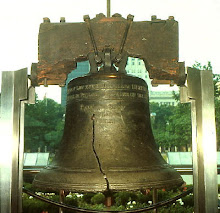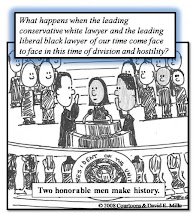
A good AP article if you have missed it. I can think of a few county court judges who might want to read this. Should worry more about the law then the color of their robes.
WASHINGTON (AP) — The Supreme Court on Monday seemed headed toward telling police they have to explicitly warn criminal suspects that their lawyer can be present during any interrogation.
The arguments in front of the justices were the latest over how explicit the Miranda warning rights have to be, as justices debated whether the warnings police gave Kevin Dwayne Powell made clear to him that he could have a lawyer present while being interrogated by police.
Powell, a convicted felon, was convicted of illegally possessing a firearm after telling police he bought the weapon "off the street" for $150 for his protection. Before his confession, Powell signed a Miranda statement that included the statements "You have the right to talk to a lawyer before answering any of our questions. If you cannot afford to hire a lawyer, one will be appointed for you without cost and before any questioning. You have the right to use any of these rights at any time you want during this interview."
The Florida Supreme Court overturned the conviction on grounds the Tampa police didn't adequately convey to Powell that he was allowed to have a lawyer with him during questioning.
Joseph W. Jacquot, Florida deputy attorney general, argued that the warning given Powell "expresses all the rights required under Miranda."
Justice Stephen Breyer clearly disagreed.
"Aren't you supposed to tell this person, that unlike a grand jury, you have a right to have the lawyer with you during interrogation?" Breyer said. "I mean, it isn't as if that was said in passing in Miranda. They wrote eight paragraphs about it. And I just wonder, where does it say in this warning, you have the right to have the lawyer with you during the interrogation?"
Different courts have came down on different side on what exactly should be said, Justice Sonia Sotomayor said.
"We've got a split of circuit courts and state courts on whether this reasonably conveys or not. Shouldn't that be enough of an ambiguity for us to conclude it can't reasonably convey, if there's this many courts holding that it doesn't?" Justice Sonia Sotomayor said.
Powell's lawyer, Deborah K. Brueckheimer, said that the warning Powell was given from Tampa, police gave him the impression that "once questioning starts, that he has no right to consult with a lawyer anymore, and it certainly doesn't tell him that he has the right to the presence of an attorney with him in an interrogation room, where the coercion takes on a highly new meaning."
Justice Scalia called Brueckheimer's argument "angels dancing on the head of a pin."
"You are saying, 'Oh, if he had only known. Oh, if I knew that I could have an attorney present during the interview, well, that would have been a different kettle of fish and I would never have confessed,"' Scalia said. "I mean, doesn't that seem to you quite fantastic?"
Miranda rights have been endlessly litigated since they first came into being in 1966. The courts require police to tell suspects they have the right to remain silent and the rights to have a lawyer represent them, even if they can't afford one. But those requirements likely will continue to be parsed by lawyers and judges.
For example, Justice Samuel Alito pointed out that most police start off Miranda rights by saying "You have the right to remain silent." But, Alito said, what happens if someone begins talking to the police and then decides that they want to be silent?
"Once you break your silence, there is nothing in there that says you have the right to resume your silence," Alito said.
"We could write that down. It could be the next case," Justice Anthony Kennedy said to laughter.
The case is Florida v. Powell, 08-1175. Note, Florida, where agencies like FLPD and BSO have had to change their Miranda forms for material omissions in the advisements. One of the last great wins for Ellis Rubin, the Commander.
My take? Well, let' see. I am a criminal defense lawyer. Got a stuffed fish in my office. Says on the plaque "I would not be here had I shut my mouth." Enough said? Yup. Kinda like some guy goes up to President Warren Harding, known for very few words, at a ballgame. Yeah, a hundred years ago you could walk up to a President. Now you can just go to the White House to see them if you do reality shows.
So a dude says to Mr. Harding: "I made a bet with my buddy I could get you to say three words to me, Mr. Harding." The President turns to him, says "You lose." So when you around the boys in blue, keep a smile in your hearts and a zipper on your lips.
































No comments:
Post a Comment